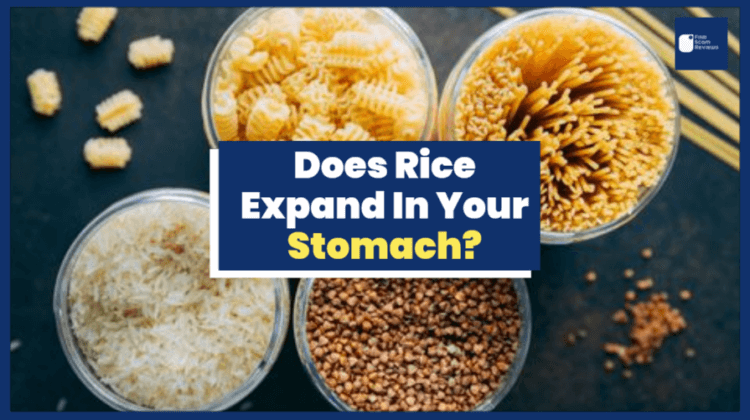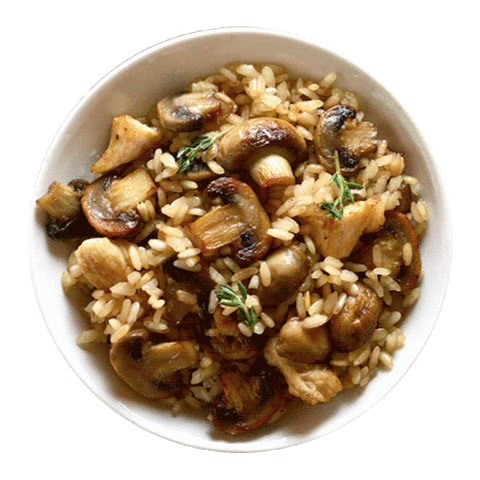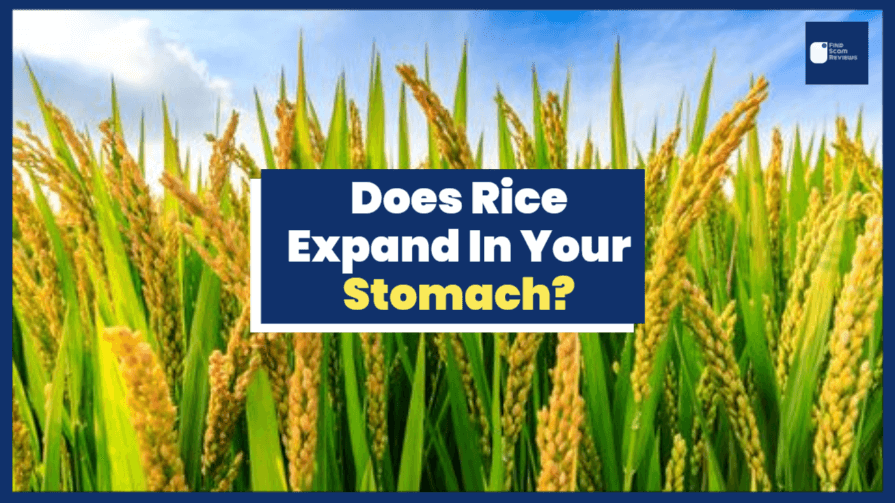
Does Rice Expand In Your Stomach? The Surprising Truth
We’ve all been there before—after eating a huge meal, we feel like our stomachs have expanded to twice their size. And while it may feel like rice is to blame for this bloat, the truth is much more complicated.
In this article, we’ll explore the science behind why we feel bloated after eating and whether or not rice is really to blame. We’ll also dispel some common myths about bloating and offer tips on how to avoid it. So if you’ve ever wondered, “Does rice expand in your stomach?” read on for the answer.

The science behind rice and digestion
Rice is a staple food in many cultures and is known for being easy to digest. But what is the science behind this?
Rice is a complex carbohydrate broken down into simpler sugars during digestion. This process is helpful because rice is a good source of amylose. Starch is more easily broken down than other types of starch.
Rice is also a good source of soluble fiber, which helps to keep the digestive tract healthy. In addition, rice is low in fat and has a neutral pH, both of which help to make it easy on the digestive system.
So if you’re looking for a food that is easy to digest, rice may be a good option. Just be sure to choose a variety that is right for your needs, as many different types of rice are available.
Does rice expand in your stomach?
You may have heard the claim that rice expands in your stomach, making you feel fuller and less likely to overeat. But is there any truth to this claim?
Rice is a complex carbohydrate; like other complex carbs, it takes longer to digest than simple carbs such as sugar or flour. This means that it can help you feel fuller for longer after eating. Additionally, rice is a low-calorie food so it can be a valuable part of a weight-loss diet.
However, there is no evidence that rice expands in your stomach. While it may take longer to digest than other carbs, it does not cause your stomach to stretch or grow. So, don’t worry about overeating if you enjoy a bowl of rice for dinner.
ALSO READ: The 19 Best Win Win Food Delicious Healthy Eating for No Fuss Lovers
How much rice should you eat?

There is no definitive answer to this question as it depends on factors such as age, activity level, and whether you are trying to lose, gain, or maintain weight. However, the USDA (U.S. DEPARTMENT OF AGRICULTURE) recommends that adults eat between 3-6 ounces of grains daily, with at least half of those coming from whole grains. For perspective, one cup of cooked rice is about three-ounce equivalents.
So how much rice should you eat? It depends on your needs, but the USDA’s recommendations can give you a starting point. To help make your decision easier, we’ve also put together a list of the four best types of rice for different health needs.
The USDA recommends that adults eat between 5 and 6 ounces of cooked rice daily, about 1/2 to 3/4 cups.
Here are some suggestions for how to include rice in your diet:
1) As a side dish with meals
Rice is a versatile food that can be enjoyed in various ways. It can be eaten as a main dish or used as a side dish with other meals. Rice is high in carbohydrates and is a good source of energy. It is also low in fat and cholesterol.
There are many different types of rice, each with its unique flavor and texture. White rice is the most common type of rice, but other popular types include brown rice, basmati rice, and jasmine rice.
Rice can be cooked in various ways, including boiled, steamed, and fried. It can also be used in recipes for soups, stews, and casseroles. No matter how you choose to enjoy it, rice is delicious and nutritious food that will surely please everyone at the table.
2) Rice soups and stews
As the weather gets colder, we crave heartier, warming dishes. For many of us, this means soups and stews. And what goes better with soup than a big bowl of rice?
Rice is a staple in many cuisines worldwide, and it’s no surprise that it also showcases well in soups and stews. Whether it’s Spanish-style Arroz con Leche or Japanese-style miso soup, there’s a rice-based soup for everyone.
If you’re looking for a new twist on an old classic, why not try making a rice soup or stew the next time you’re in the mood for something comforting and delicious? Start by cooking the rice in water or chicken stock until tender, then add it to sautéed onions, garlic, and vegetables with some seasonings.
You can use whatever vegetables you like, but we love adding carrots, mushrooms, celery, diced tomatoes, and leafy greens.
Once everything is cooked, puree the soup until smooth or leave it chunky – it’s up to you!
3) As a breakfast cereal, either cooked like oatmeal or dried and eaten cold like cereal
There are many benefits to eating rice for breakfast. Rice is a complex carbohydrate, which means it will give you lasting energy throughout the morning. It is also a good source of vitamins and minerals and low in sugar. So if you’re looking for a healthy and delicious breakfast option, give the rice a try!
4) As a rice pudding for dessert
Rice pudding is a classic dessert that can be enjoyed in many different ways. As rice pudding, it can be simply rice pudding flavored with various spices, or it can be Rice Pudding with raisins and other dried fruits. It can also be rice pudding with fresh fruits such as strawberries or raspberries. No matter how it is made, rice pudding is a delicious and comforting dessert.
FAQ
Does rice expand in your stomach if you drink water?
No, rice does not expand in your stomach if you drink water. This is a myth that numerous studies have debunked. Rice is a complex carbohydrate broken down into glucose and absorbed into the bloodstream.
Drinking water does not cause the rice to expand in the stomach or elsewhere in the body.
Does brown rice expand in your stomach?
There is no definitive answer to this question as it depends on several factors, including the type of rice, the cooking method, and the individual’s digestive system.
However, some experts believe brown rice can expand in the stomach and cause discomfort. It is recommended that those susceptible to stomach issues avoid eating brown rice or other food that may trigger symptoms.
Does bread expand in your stomach?
Bread is a staple food in many cultures and is often eaten in large quantities. But does bread expand in your stomach, as some people claim?
The answer is not clear. No scientific evidence supports the claim that bread expands in your stomach. However, some theories could explain why some people believe this to be true. One approach is that when bread is digested, it produces gas that can make you feel bloated and full. Another theory is that eating bread can trigger a release of hormones that make you feel full.
So what is the verdict? No concrete evidence supports the claim that bread expands in your stomach. However, some theories could explain why some people believe this to be true.
Does pasta expand in your stomach?
It’s a common rumor that pasta expands your stomach and makes you feel fuller for longer. But is there any truth to this claim?
Pasta is made up of carbohydrates, which are a type of macronutrient. Carbohydrates are broken down into glucose, which is then used for energy by the body. When you eat pasta, your body digests carbohydrates and turns them into glucose.
Glucose is a type of sugar that is found in many foods. It is absorbed into the bloodstream and used for energy by the cells. After you eat pasta, the glucose levels in your blood will increase. This can cause your pancreas to release insulin, which helps to regulate blood sugar levels.
Insulin is a hormone that helps to regulate blood sugar levels. If your blood sugar levels are high, insulin helps
to move the sugar out of your blood and into your cells, where it can be used for energy.
If you have diabetes, your body does not make enough insulin, or your cells do not respond appropriately to insulin. This can cause high blood sugar levels (hyperglycemia), leading to serious health problems.
Does rice expand when cooked?
It is a common misconception that rice expands when cooked. However, this is not the case. Rice comprises small grains that do not grow when exposed to heat. The rice you see on your plate is the same size as the rice grain before it was cooked.
Rice and weight gain
Rice is a staple food in many cultures, but it has come under scrutiny in recent years for its potential to contribute to weight gain. It is high in carbohydrates and has a high glycemic index, which can cause spikes in blood sugar levels. These spikes can lead to increased hunger and cravings and, over time, can contribute to weight gain.
While rice certainly has the potential to contribute to weight gain, it is not the only factor. Other factors such as diet, activity level, and genetics also play a role. Therefore, it is essential to consider these factors when trying to lose or maintain weight.
Does rice expire?
This is a common question because rice is a staple in many people’s diets. While rice does not have a definitive expiration date, it can start to become rancid after a few months. This is due to natural oils in rice that can go bad over time. If you notice that your rice has a sour smell or is discolored, it is probably time to throw it out.
So, while rice doesn’t technically expire, it is best to consume it within a few months of purchase to ensure it is fresh.
The bottom line

The rumor may have started because people felt fuller after eating rice, but no scientific evidence supports the claim. It is safe to say that rice does not expand in your stomach. So, enjoy the rice!
